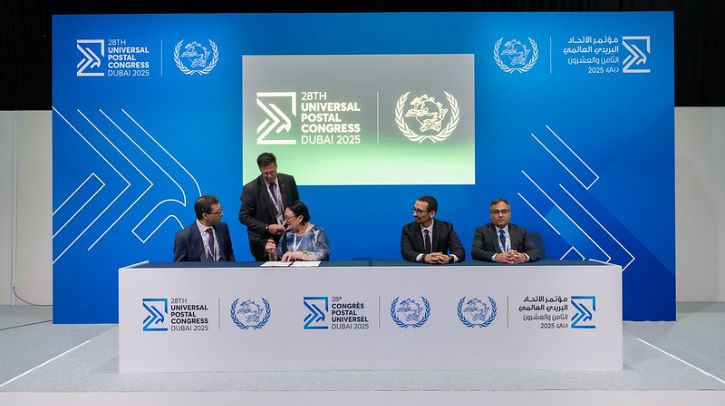The Universal Postal Union’s (UPU) 28th Universal Postal Congress closed in Dubai, United Arab Emirates, on September 19, having set a path for the transformation of the global postal network over the next four years and showcased the organization’s first AI agent.
The congress bought together representatives from 169 member countries and observers for two weeks of debate and decision-making on the future of the sector.
In his closing remarks, UPU director general Masahiko Metoki, said, “This congress has been more than a gathering. It has been a moment of transformation, during which we faced challenges head-on, redefined our role in a rapidly changing world and reaffirmed the values that unite us.”
Strategy for 2026-2029
Member countries adopted the UPU’s Strategy (2026-2029) and its associated roadmap, the Dubai Business Plan. The strategy sets out a new vision for the UPU’s role in building an interconnected, inclusive and sustainable society powered by an innovative postal network.
Its three strategic goals focus on building a cohesive global postal network through rules-based multilateral cooperation, advancing innovation and partnerships to modernize postal services, and promoting development via stronger regional cooperation and technical assistance.
The Dubai Business Plan translates these goals into targeted, measurable actions, covering areas such as digitalization, cybersecurity, postal policy and regulation, and development cooperation.
Member countries reaffirmed their support for the role of sustainability in the development of postal services – including those focused on energy resilience, the empowerment of women and social services – and keeping the network competitive.
There was also a push for increased regional presence of the UPU to support the development of the network across all countries, leaving none behind in the sector’s evolution.
Finally, the UPU’s member countries supported maintaining the exceptional budgetary ceiling increase adopted at the UPU’s 2023 Extraordinary Congress for the 2026-2029 period.
Spotlight on AI
A major innovation highlight in Dubai was the presentation of the UPU’s first AI agent, currently in the pilot phase. Developed with seed funding from Japan and born out of the UPU’s Innovation Challenges, the tool leverages the UPU’s Unified Data Platform to analyze big data and provide insights on postal development.
The AI agent is designed to support policy and regulatory and operational decision-making, with potential applications spanning from customs clearance to last-mile delivery. By test driving solutions and offering country-level analysis, it aims to improve postal reach, reliability and resilience.
José Anson, a UPU economist, explained, “If you don’t develop an ecosystem of AI agents, you cannot preserve your competitive advantage as a postal logistics company, you are going to lag well behind your customers’ expectations and you are going to risk losing relevance.
“These agents are going to revolutionize the customer experience. At the end of the day, the postal business is all about the customer experience,” he added.
The UPU is working on enriching data sources available to the AI agent, targeting data sharing between traditional postal stakeholders – postal operators, regulators and governments – and partners such as UPU Consultative Committee members and organizations collecting data on trade and aviation.
The UPU’s Unified Data Platform and its AI agent will run on the UPU’s trusted, secure .POST top-level domain, applying a rigorous data governance framework. The platform offers the maximum granularity of rights and permissions, meaning countries have full control over whether and how their data is shared across the network.
While the tool is in its pilot phase, Anson explained that the UPU hopes to test with member countries that attended the congress this week to see how it might be evolved and to source resources for its expansion.
In related news, UPU and ICAO partner on strengthening airmail security


